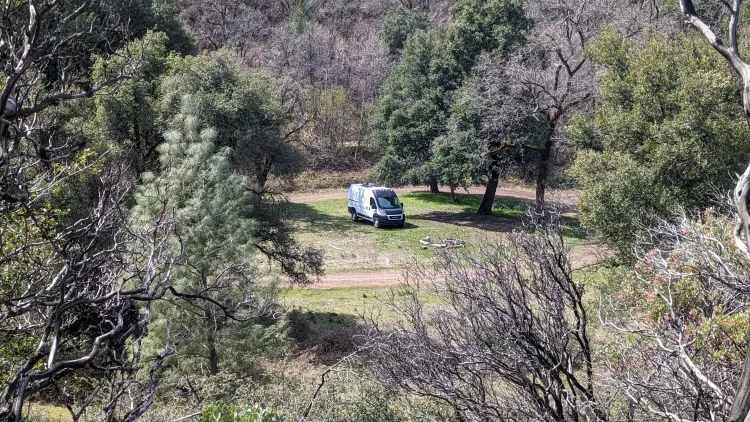Sustainable Travel: A Minimalist Way Of Embracing Eco-Friendly Adventures
With careful planning, thinking, and being mindful of what you do, you can make your minimalist travels sustainable.
Travelling is a phenomenal way to see the world and create personal growth. Making it sustainable and eco-friendly is essential in lessening your impact on the world.
While minimalists already adopt some aspects of sustainability, there's more that we can do to embrace eco-friendly adventures. In this sustainability guide, we'll go over everything you need to know to make your travels more sustainable.
Table Of Contents
Want to explore more about minimalist travel? Check out The Ultimate Guide To Minimalist Travel from Autogenic Amusements.

What Is Minimalist Travel?
The idea of minimalist travel is about not being burdened by your belongings, gathering more meaningful experiences, experiencing cultures or locations in more depth, and ensuring your travels are more sustainable.
To know more, check out my articles about what minimalist travel is, how you can embrace minimalist travel and some essential tips about minimalist travel to get you started!
What Is Sustainable Travel?
Sustainable travel is the practice of vacationing and seeing the world in an environmentally and socially conscious way. It means protecting our world and the cultures that we visit. Here are some of the main differences between normal travel and sustainable travel:
- Sustainable travel incorporates green practices. Doing what's better for the environment is a priority. Normal travel might not include efforts to lessen your impact on the world.
- As opposed to normal travel, sustainable travel means leaving a culture intact and not changing it or "westernizing" it. This means experiencing a destination for what it has to offer as opposed to searching out western amenities where they shouldn't be.
It all comes down to having less of an impact while still enjoying your journey.
Is Sustainable Travel A New Trend?
Sustainable travel is a growing trend that has been increasing in popularity. With more information available, better climate initiatives, and increasingly conscious travellers, more people want to see a positive change in the way they travel.
While the trend is not "new" per se, its moment in the limelight has been an important change towards eco and culture-friendly ways to see the world. For instance, Airbnb now has some of the following sustainable categories: tiny homes, yurts, off-grid, container homes, etc.
Another example is hotels now have many more green actions they take to lessen their impact on the world. From door handle signs saying whether you want your room cleaned, to reusing towels, to keycard slots that turn off the lights and AC when you leave your room, it's apparent that even big hotels are taking steps in the right direction.
In fact, the trend has seen a nearly 500% increase in popularity over the last 10 years:

The sustainable travel trend is here to stay. More and more aspects of travel are becoming greener and better for the world.
The 3 Components Of Sustainable Tourism
There are 3 main factors that are involved with sustainable tourism. Ecology, socio-culture, and socio-economy. These 3 aspects, when respected properly, ensure tourism can continue in a way that doesn't negatively impact its environment or culture.

- Ecology. This area of interest covers the natural world around us. The environment and its natural resources must be safeguarded from destruction due to tourism.
- Socio-culture. Culture means the way of life, the people, and the history of the destination. Protecting this aspect of sustainable tourism means keeping a place's customs intact and not turning it into something that only exists to cater to tourism.
- Socio-economy. This means the economy, the jobs, and the working conditions of the places we visit. Protecting this aspect of a destination means enriching the economy in sustainable and humanitarian ways.
When we keep ecology, socio-culture, and socio-economy in mind during our travels, we can ensure what we do is more sustainable.
Now, let's dig into why this is so important...
The Negative Impacts of Travel

While there are plenty of benefits to travelling like personal growth, learning, cultural immersion, and bettering an economy, there are aspects of travel that have negative impacts on the destination. Here are some of the big ones:
- Loss of culture. When a destination becomes too popular, it often loses its authenticity to make way for more amenities that cater to tourists. Many deep cultured areas are becoming westernized with the increase of visitors and foreign investors.
- Lack of authenticity. Some places no longer provide authentic experiences and are instead shown off as a spectacle. For example, some of the world's most stunning rice crops in Bali are only farmed manually to keep up a cultural appearance and to show off its history.
- Environmental impact. Flights, hotel amenities, restaurants, etc. all have negative impacts on the environment by way of overusing resources, and leading to more emissions than when not travelling.
- Offshore company profit. Travel takes away from the economy of the local destination. While places like hotels, tours, and restaurants often employ locals, the majority of the profit does not end up in their pockets.
- Disruption of the flora and fauna. One of the worst forms of tourism is using animals and the environment to make a show of a location. Elephant rides, animal petting, and ziplines through the jungle often come at the expense of the natural way of the world.
- Overtourism. Overtourism happens when tourism starts to degrade the experience of a destination. Partly due to travelling becoming more popular, partly due to social media, some of the most beautiful places have changed in a bad way due to the number of people that visit. Hotels, chain restaurants, and vehicles are some of the main ways that destinations change for the worst. This is like the kiss of death and comes with many ethical ramifications.
As you can see, there are many ways in which we contribute to the negative impacts of travel. Without proper care and awareness, the places we choose to visit will lose their sense of authenticity and naturality.
Here's how we can fix it...
The Most Sustainable Ways To Travel

Choosing to do things differently can mean you are leaving less of a negative impact while travelling. There are a number of specific things you can do to make your travel more sustainable and better for the world. From smaller accommodations to eating more local cuisine, it can be fun to be environmentally conscious. Much like how we practice minimalist travel, sustainable travel has some key ways that we can have less of an impact.
- Slow travel. Slow travel means not jet-setting as much and travelling more leisurely to one particular destination. Doing this lessens your impacts on transportation emissions by forgoing frequent flights, trains, and vehicle transportation.
- Go off the beaten path. When you choose to escape tourist hot spots, you distribute not only your funds but your footprint too. This action lessens crowds in tourism districts and spreads the love to lesser-known areas.
- Travel during the off-season. By travelling during a destination's off-season, you lessen the crowds that inevitably build during peak seasons and support the economy when its income might not be as high. You also stand to spend less on things like tours, accommodations, and flights.
- Pack only the essentials. While minimalist travel might mean buying at your destination, a more sustainable approach would be to bring what you'll need. Buying things at your location might mean you use a lot more materials like packaging or containers that will be discarded. Similarly, try not to shop abroad. It's likely not the reason you're visiting, and it only leads to more waste.
- Opt for alternative means of transportation. Flights are by far the most unsustainable means of transportation. Choosing to travel via alternative ways can lessen your impact on the environment. Try using local transportation to save money instead of using an Uber or a taxi. Walk and cycle where reasonable. Book transport buses instead of private shuttles. Trains offer a more scenic way to get to the next destination. Use Google to show the emissions of the flights you're booking.

- Support local. Instead of shopping and dining at the same place you have at home, immerse yourself in the culture of your destination by buying from local shops and businesses.
- Watch your consumption. It all adds up. When I was in Taiwan, I visited a bathhouse/ guesthouse. It had a private sauna tub in my room. Instead of filling my own, I chose to use the public bathhouse instead to save on using the spring water in my room. Likewise, turn off the lights and AC when you leave like you would do at home.
There are plenty of ways you can turn your vacation into an eco-friendly trip. Many of the best ways blend the line between minimalist travel and sustainable travel. From the types of travel you choose, to what you buy, everything you do has the potential to change your environment.
3 Ways To Promote Sustainable Tourism

While practicing sustainable tourism yourself, it's not enough to make a large impact. To do that, you need to get the word out. Here are some ways that you can promote it:
- Support the right businesses. This is an easy step in the right direction and it ensures you support certain hotels, restaurants, shops, travel gear, etc. that align with your goals. Simply put, more money flows to those doing good for the environment instead of those that aren't.
- Get educated. Without the proper knowledge, it would be difficult for you to know what's right and what's wrong. For example, organizations like the United Nations World Tourism Organization promote the best places to travel that keep sustainability in mind.
- Volunteering and cultural exchange programs: Contribute to local communities through volunteering opportunities that promote sustainable development and cultural understanding.
Taking these actions allows you to "put your money where your mouth is" and start shaping the travel scene in a way that you want. You can't do it alone. Promoting this way of travel is crucial to getting everyone on board.
How To Pack Sustainably

While there are many ways you might choose to travel sustainably, what you pack is an easy first step to tackle. Not only does what you pack support ideas like choosing the right companies, but it also has an impact on things like wildlife and even our atmosphere. Here are some ways you can ensure you pack sustainably:
- Opt for fair trade, green products like backpacks from big brands such as Patagonia, Topo Designs, REI, etc.
- Buy zero-waste products. Soaps that come in biodegradable packaging, clothing with non-plastic tags, reusable plastic bags for food, camp utensils, etc.
- Lighten the load. Less weight on the plane means less fuel consumed to get you around. Of course, you won't be the person that makes or breaks this idea, but it has a better impact and it all adds up over time.
- Reusable water bottle. A simple step is using a reusable water bottle. Doing so means you contribute less to the waste in our oceans, landfills, and even the microplastics in our water.
- Practice minimalism all the time. By living your life in a minimalist way at all times, most of the choices you make will be less impactful. A great way to do this is by using a capsule wardrobe!
- Use green and animal-friendly products like reef-safe sunscreen, or cruelty-free products that aren't tested on animals.
Implementing these tips allows you to embrace some minimalist concepts while supporting a better way of consuming and travelling. Adopting these practices will lessen your impact on the world.
For more information about what to pack as a minimalist, you can check out my article on minimalist packing for two months abroad!
Why You Should Travel Sustainably

Now that we have sufficient background on what sustainable tourism is, how we can do it, and how not to do it, let's build a case for why you should adopt its practices. Here's a list of reasons why you should travel sustainably:
- Environmental conservation. When you travel sustainably it means less destruction of nature instead of making way for hotels and airports. It also means no mistreatment of wildlife when choosing to forgo elephant rides and monkey tours.
- Save money. Choosing to experience travel alternatively can mean you save money. For example, simple accommodations can be cheaper than chain hotels, local food is cheaper than restaurants, and public transit is often cheaper than car hires.
- Cultural Preservation. Sustainable travel helps maintain and promote the authentic culture of the destination.
- The right to travel. There are plenty of examples of governments or people limiting the number of travellers a place can accommodate. When we travel sustainably, we promote a way of experiencing a location that works for the betterment of a destination versus leaving a place worse than we found it and having the locals feel disdain for all travellers.
- Personal fulfillment. Sustainable travel allows you to immerse yourself in authentic experiences, connect with nature, and create meaningful memories.
- Economic enrichment. Sustainability brings more money to a destination and creates jobs.
- New opportunities. Going off the beaten path and venturing out of tourist areas allows other areas of a country to prosper instead of the same resort and hotel strips that typically reap all the rewards of tourism.
With so many benefits, it makes it easy to start travelling sustainably. From personal experiences to cultural enrichment, choosing to travel sustainably not only benefits yourself but also the world.
Conclusion
Minimalism and sustainable travel are great ways to enjoy travelling while ensuring you have a positive impact on the environment and the cultures you visit. By understanding what sustainable travel is, the negative impacts of travel, how to pack and travel sustainably, how to promote it, and its benefits, we can continue to see the true beauty of the world and its people.
I'd love to hear from you!
What does sustainable travel mean to you? Anything you'd like to add to help others? Let me know in the comments below.







Member discussion